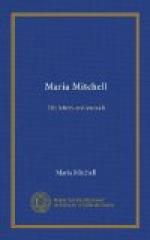“Aylesbury is a small town, and Stone is a very small village. The driver stopped at what seemed to be a cultivated field, and told me that I was at my journey’s end. On looking down I saw a wheelbarrow near the fence, and I remembered that Mrs. Smyth had said that one would be waiting for our luggage, and I soon saw Mrs. Smyth and her daughter coming towards us. It was a walk of about an eighth of a mile to the ’Lodge’—a pleasant cottage surrounded by a beautiful garden.
“Admiral Smyth’s family go to a little church seven hundred years old, standing in the midst of tombstones and surrounded by thatched cottages. English scenery seems now (September) much like our Southern scenery in April—rich and lovely, but wanting mountains and water. An English village could never be mistaken for an American one: the outline against the sky differs; a thatched cottage makes a very wavy line on the blue above.
“We find enough in St. John’s Lodge, in the admiral’s library, and in the society of the cultivated members of his family to interest us for a long time.
“The admiral himself is upwards of sixty years of age, noble-looking, loving a good joke, an antiquarian, and a good astronomer. I picked up many an anecdote from him, and many curious bits of learning.
“He tells a good story, illustrative of his enthusiasm when looking at a crater in the moon. He says the night was remarkably fine, and he applied higher and higher powers to his glass until he seemed to look down into the abyss, and imagining himself standing on its verge he felt himself falling in, and drew back with a shudder which lasted even after the illusion was over.
“In speaking of Stratford-upon-Avon, the admiral told me that the Lucy family, one of whose ancestors drove Shakspere from his grounds, and who is caricatured in Justice Shallow, still resides on the same spot as in Shakspere’s time. He says no family ever retained their characteristics more decidedly.
“Some years ago one of this family was invited to a Shakspere dinner. He resented the well-meant invitation, saying they must surely have forgotten how that person treated his ancestor!
“The amateur astronomers of England are numerous, but they are not like those of America.
“In America a poor schoolmaster, who has some bright boys who ask questions, buys a glass and becomes a star-gazer, without time and almost without instruments; or a watchmaker must know the time, and therefore watches the stars as time-keepers. In almost all cases they are hard-working men.
“In England it is quite otherwise. A wealthy gentleman buys a telescope as he would buy a library, as an ornament to his house.
“Admiral Smyth says that no family is quite civilized unless it possesses a copy of some encyclopaedia and a telescope. The English gentleman uses both for amusement. If he is a man of philosophical mind he soon becomes an astronomer, or if a benevolent man he perceives that some friend in more limited circumstances might use it well, and he offers the telescope to him, or if an ostentatious man he hires some young astronomer of talent, who comes to his observatory and makes a name for him. Then the queen confers the honor of knighthood, not upon the young man, but upon the owner of the telescope. Sir James South was knighted for this reason.




